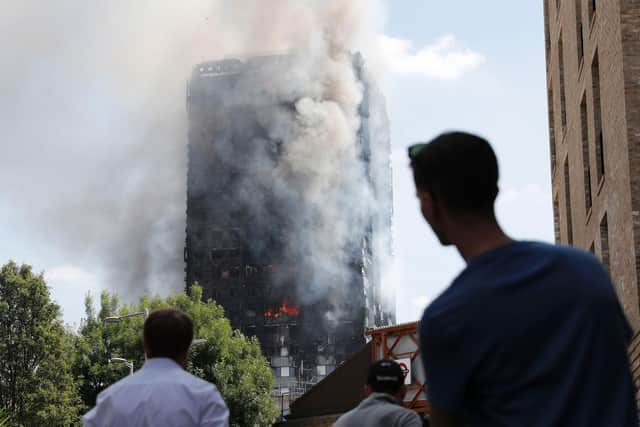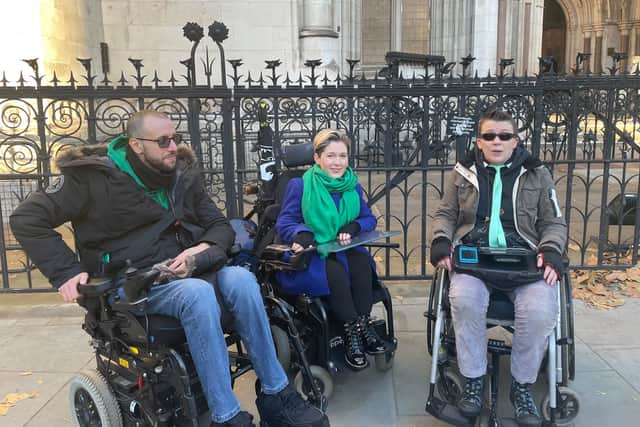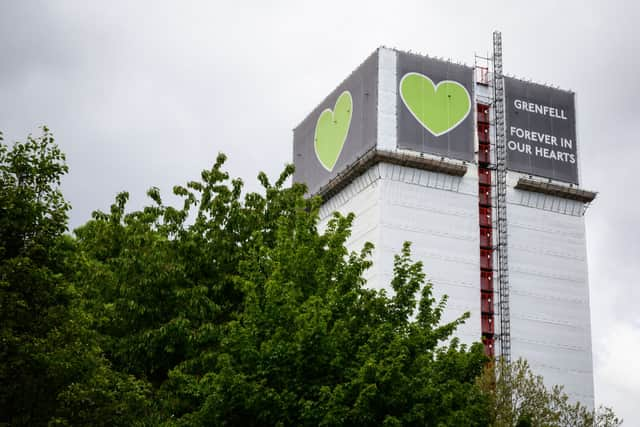Grenfell Tower fire: firefighters ‘freaked out’ and told disabled resident to stand up, High Court told
and live on Freeview channel 276
Firefighters rescuing a disabled resident from Grenfell Tower “freaked out” when they saw she was in a wheelchair and told her stand up, a court has heard.
The account was narrated at London’s Royal Courts of Justice on Tuesday (6 December), as campaign group Claddag began their fight against the government over its failure to implement recommendations made in the Grenfell Tower Inquiry.
Advertisement
Hide AdAdvertisement
Hide AdIt was advised during the Inquiry’s first phrase, published in October 2019, that Personal Emergency Evacuation Plans (PEEPs) should be prepared for disabled people living in high-rise residential buildings. However, the Home Office decided not to implement them on the grounds of “practicality,” “proportionality”, and “safety”.
As part of the opening argument against this decision, Barrister Raj Desai, who is representing Claddag, told the High Court of a wheelchair user’s experience while being rescued from Grenfell Tower. He said firefighters did not know how to handle her - telling her to stand up and, when she said she could not, exclaiming, “oh my god, we’ll have to carry her down.”


She was eventually rescued, albeit after being left in her flat while the fire service decided what to do and vacated the rest of her family. But, Mr Desai explained, in being rescued, this particular resident was a rare case as those who died were “disproportionately persons with disabilities” whose “ability to self-evacuate was compromised.”
He told the judge: “In each and every such case, there was no plan or arrangement in place to either assist such residents to evacuate or share relevant information with the fire and rescue service to facilitate their rescue.” Therefore, he continued, the claimants, Cladagg co-founders Sarah Rennie and Georgie Hulme, “seek an order quashing the decision not to implement the recommendations.”


Advertisement
Hide AdAdvertisement
Hide AdBoth Ms Rennie and Ms Hulme were present at the courthouse for the hearing, joined by fellow housing safety campaigners and disabled leaseholders living in unsafe buildings. Speaking outside the Royal Courts of Justice, Ms Rennie, who uses a wheelchair and whose high-rise flat in Birmingham has unsafe cladding, told NationalWorld: “We’re here as a physical presence, to remind the judge that there are real people behind this intellectual debate. We exist. We’re here.”
Meanwhile, Ms Hulme, who has chronic pain syndrome, Irlens syndrome, and adult onset Tourette’s syndrome, and lives in a mid-rise block in Manchester which also has a host of fire safety issues, explained prior to the case that it was a chance to “fully hold the government to account”. She condemned the Home Office’s decision not to implement PEEPs as “demonstrating that those who need support to evacuate in an emergency are deemed as being worth less.”
The 43-year-old campaigner also told NationalWorld: “It’s not only discriminatory, but also disrespectful to those who died, survived and are bereaved due to the Grenfell Tower fire.”


72 people died following the outbreak of the Grenfell Tower fire on 14 June 2017, and almost half of these (41%) were disabled. Mr Desai insisted as a result: “There is an obvious disadvantage between those with disabilities and those without in terms of enjoying fire safety evacuation.”
Advertisement
Hide AdAdvertisement
Hide AdHe also added that even in the cases of the 22 disabled residents who were rescued, the “risks and pitfalls of being forced to rely on unplanned rescues are stark”. He gave the example of the firefighters who “freaked out” at the sight of a wheelchair, and an example given by Ms Rennie, who had told him “if she was mishandled” by firefighters who had no knowledge of her needs during a rescue, because of her disabilities, “her bones would likely break.”
One campaigner who was present at the court was Jennifer Frame, who had shown up in support of Claddag. She said she understood the “stress, anxiety and trauma” that surrounded housing safety issues, as she was a resident of Richmond House in Worcester Park, which burnt down in 2019. Like Grenfell, the development lacked adequate cavity barriers to prevent the spread of fire.
Ms Frame told NationalWorld: “You can’t tell people that they don’t deserve to escape because they are disabled. No one should be disadvantaged because of their circumstances. Everyone deserves to escape.”
She said she was happy she had been able to take time off work to support Claddag, but admitted she “almost can’t believe that the justice is so great that it has gotten to this point.” She explained: “Going through a legal process is adding trauma on top of trauma. People are left in limbo all these years on, with no clue of when this is going to end. How much of your life is it okay to lose to fighting?”
Advertisement
Hide AdAdvertisement
Hide AdMs Frame is still in temporary housing, three years on from the fire at Richmond House.
The High Court hearing is due to end on Wednesday (7 December), with Mrs Justice Stacey considering both Claddag’s and the Home Office’s arguments on whether or not to mandate the implementation of PEEPs.
Claddag has crowdfunded to protect them against the government’s legal costs should their case fail. It has thanked “supporters and allies” on their social media who helped them raise £21,500.
Comment Guidelines
National World encourages reader discussion on our stories. User feedback, insights and back-and-forth exchanges add a rich layer of context to reporting. Please review our Community Guidelines before commenting.
